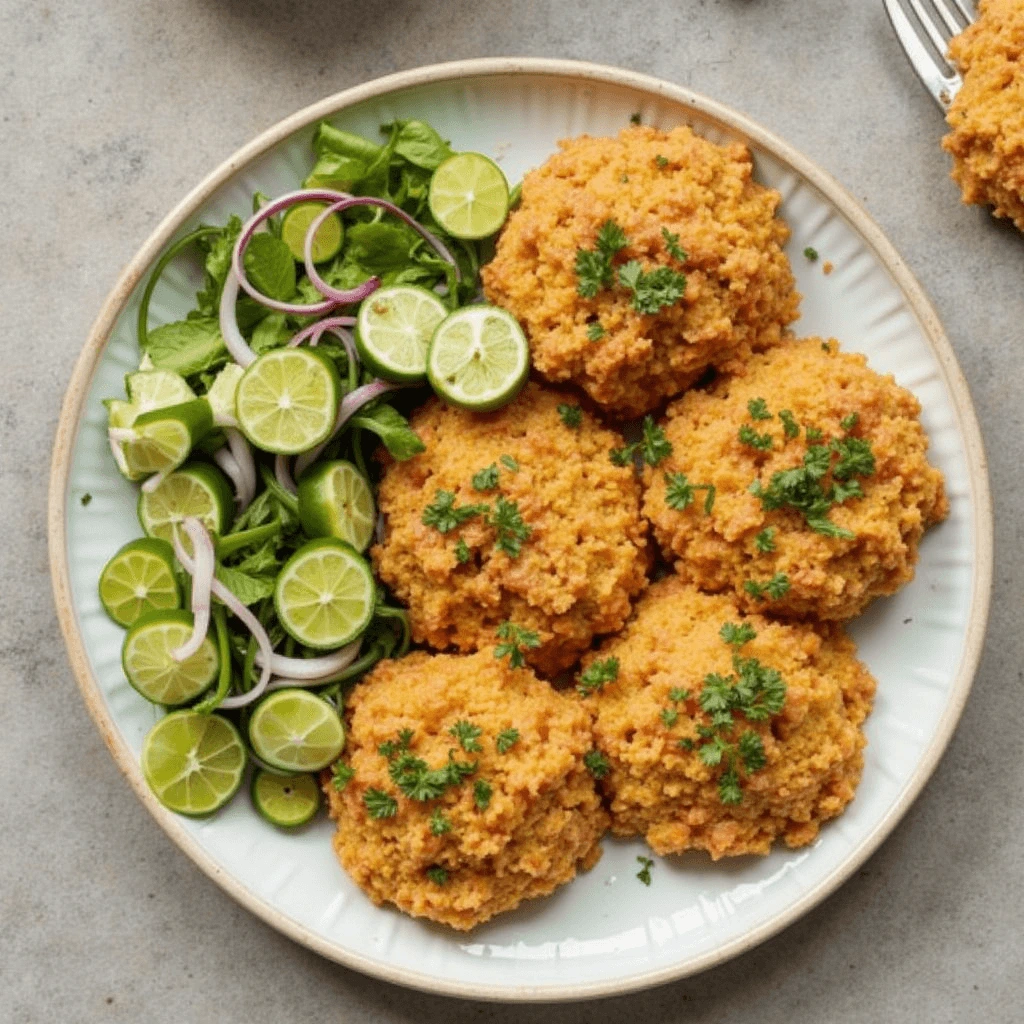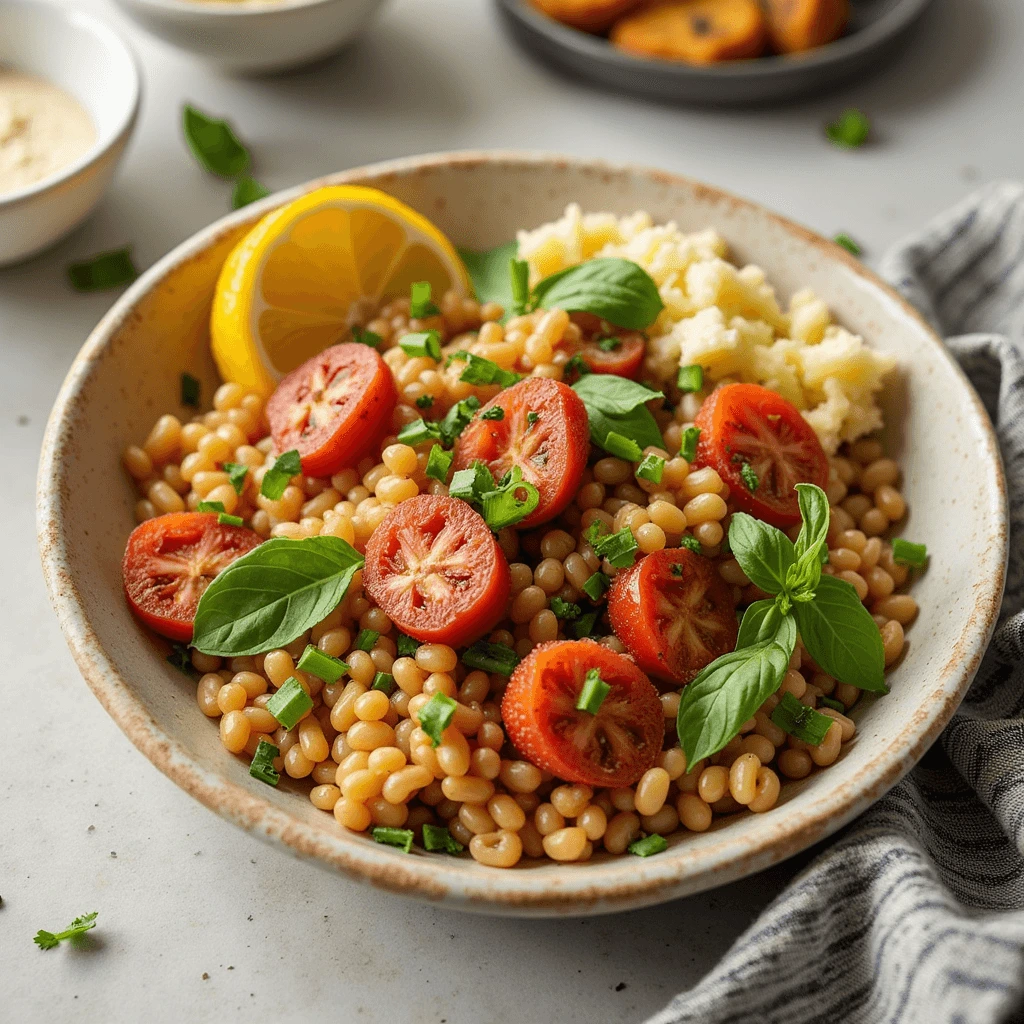Polycystic Ovary Syndrome (PCOS) is a hormonal condition that affects many women worldwide. A healthy diet, particularly one focused on PCOS lunch recipes, can help manage symptoms like insulin resistance, inflammation, and irregular hormone levels. By incorporating nutrient-dense foods, you can create meals that are not only delicious but also beneficial for your overall health.
Lunch is especially important for women with PCOS. A well-balanced lunch helps maintain stable blood sugar levels, reduces cravings, and sustains energy throughout the day. In this guide, we’ll explore PCOS lunch recipes that are easy to make, satisfying, and loaded with the right nutrients.
Why Focus on PCOS Lunch Recipes?
A healthy lunch tailored to PCOS management can:
- Stabilize Blood Sugar: By incorporating low glycemic index (GI) foods, PCOS lunch recipes prevent sugar spikes.
- Support Hormonal Health: Healthy fats and lean proteins regulate hormones and improve satiety.
- Reduce Inflammation: Anti-inflammatory ingredients like leafy greens, nuts, and olive oil promote better overall health.
By focusing on nutrient-rich PCOS lunch recipes, you can take control of your symptoms while enjoying delicious meals.
1. Quinoa and Kale Salad with Lemon-Tahini Dressing
This fiber-packed salad combines quinoa, a complete protein, with kale, a nutrient powerhouse. It’s a staple among PCOS lunch recipes for its simplicity and health benefits.
Ingredients:
- 1 cup cooked quinoa
- 2 cups chopped kale
- ½ cup cherry tomatoes, halved
- ½ avocado, sliced
- 2 tablespoons sunflower seeds
- For the dressing:
- 2 tablespoons tahini
- Juice of 1 lemon
- 1 teaspoon honey or maple syrup
- 1 clove garlic, minced
Instructions:
- Massage kale with a drizzle of olive oil until tender.
- Combine kale, quinoa, cherry tomatoes, avocado, and sunflower seeds in a large bowl.
- Whisk the dressing ingredients until smooth and drizzle over the salad.
- Toss and enjoy a refreshing, PCOS-friendly lunch.
2. Lentil and Spinach Soup
Lentils are a great source of plant-based protein and fiber, making them a favorite in PCOS lunch recipes. Spinach adds magnesium and iron, two nutrients often lacking in women with PCOS.
Ingredients:
- 1 cup dried green lentils, rinsed
- 1 tablespoon olive oil
- 1 onion, chopped
- 3 garlic cloves, minced
- 2 cups fresh spinach
- 4 cups vegetable broth
- 1 teaspoon turmeric
- ½ teaspoon cumin
- Salt and pepper to taste
Instructions:
- Heat olive oil in a pot over medium heat. Sauté onion and garlic until fragrant.
- Add lentils, turmeric, cumin, and broth. Bring to a boil, then simmer for 20–25 minutes.
- Stir in spinach and cook until wilted.
- Serve warm as a comforting PCOS lunch recipe.
3. Zucchini Noodles with Pesto and Grilled Shrimp
Low in carbs and rich in nutrients, zucchini noodles are perfect for managing insulin resistance. Combined with shrimp and pesto, this dish is both satisfying and healthy.
Ingredients:
- 2 medium zucchinis, spiralized
- 1 cup cooked shrimp
- 2 tablespoons pesto
- 1 tablespoon olive oil
- Salt and pepper
Instructions:
- Heat olive oil in a skillet and sauté shrimp until pink.
- Toss zucchini noodles with pesto until evenly coated.
- Top with shrimp and serve immediately.

4. Grilled Salmon with Steamed Broccoli and Sweet Potato Mash
This dish is a complete meal, providing omega-3 fatty acids, fiber, and slow-digesting carbohydrates. It’s a standout in PCOS lunch recipes.
Ingredients:
- 1 salmon fillet
- 1 cup steamed broccoli
- 1 medium sweet potato, boiled and mashed
- 1 tablespoon olive oil
Instructions:
- Season salmon with salt and pepper, then grill for 4–5 minutes on each side.
- Mash the sweet potato with olive oil and a pinch of salt.
- Serve salmon with steamed broccoli and sweet potato mash.
5. Buddha Bowl with Roasted Vegetables
Buddha bowls are a favorite among PCOS lunch recipes for their versatility and nutrient density.
Ingredients:
- ½ cup cooked quinoa or brown rice
- 1 cup roasted sweet potatoes and broccoli
- ½ cup chickpeas, roasted
- 1 handful of spinach
- 2 tablespoons hummus
Instructions:
- Assemble quinoa, roasted vegetables, and chickpeas in a bowl.
- Add spinach and top with hummus.
- Drizzle with olive oil and serve.
FAQs About PCOS Lunch Recipes
Q1: What makes a lunch recipe PCOS-friendly?
A PCOS-friendly lunch includes low glycemic index (GI) carbs, lean proteins, healthy fats, and fiber. These ingredients stabilize blood sugar, reduce inflammation, and promote hormonal balance.
Q2: Can I eat carbs if I have PCOS?
Yes, but focus on complex carbs like quinoa, sweet potatoes, and legumes. These foods are lower on the glycemic index and release energy slowly, preventing insulin spikes.
Q3: Are vegetarian meals suitable for PCOS?
Absolutely! Many plant-based proteins like lentils, chickpeas, and tofu are excellent for PCOS. Pair them with fiber-rich vegetables and healthy fats for a balanced meal.
Q4: Should I avoid dairy in PCOS lunch recipes?
Dairy affects women with PCOS differently. If you’re sensitive to dairy, opt for alternatives like almond milk or coconut yogurt. Otherwise, enjoy moderate amounts of high-quality dairy, such as Greek yogurt or cheese.
Q5: How can I meal prep PCOS lunch recipes?
Prepare ingredients like quinoa, roasted vegetables, and grilled proteins in advance. Store them in separate containers, so you can mix and match throughout the week.
Tips for Creating the Best PCOS Lunch Recipes
- Balance Your Plate: Include protein, fiber, and healthy fats in every meal.
- Choose Low GI Foods: Incorporate whole grains, legumes, and non-starchy vegetables.
- Incorporate Healthy Fats: Avocado, nuts, seeds, and olive oil are essential for hormonal health.
- Add Anti-Inflammatory Ingredients: Turmeric, ginger, and leafy greens reduce inflammation.
- Stay Hydrated: Pair your meals with water, herbal teas, or infused water to stay hydrated.
Conclusion
Adopting PCOS-friendly lunch recipes is a powerful way to manage symptoms and improve overall health. From quinoa salads to hearty soups and protein-packed wraps, these recipes are designed to keep you satisfied while supporting hormonal balance.
By focusing on whole, nutrient-dense ingredients, you can create lunches that not only taste great but also help manage insulin resistance and inflammation. Start with these simple recipes and customize them to your preferences.
